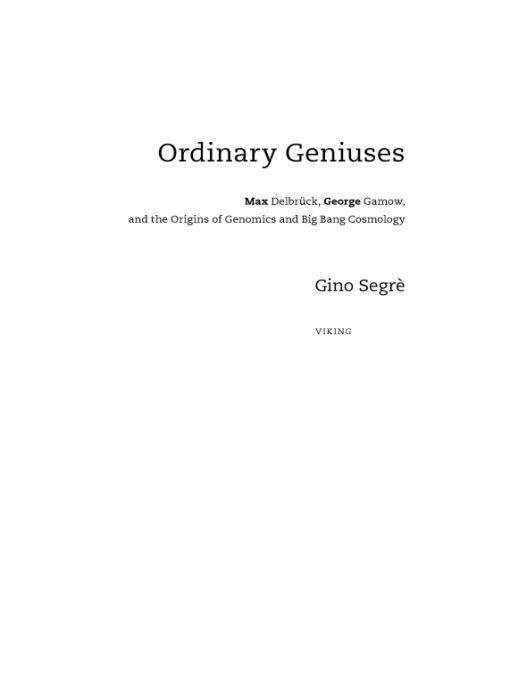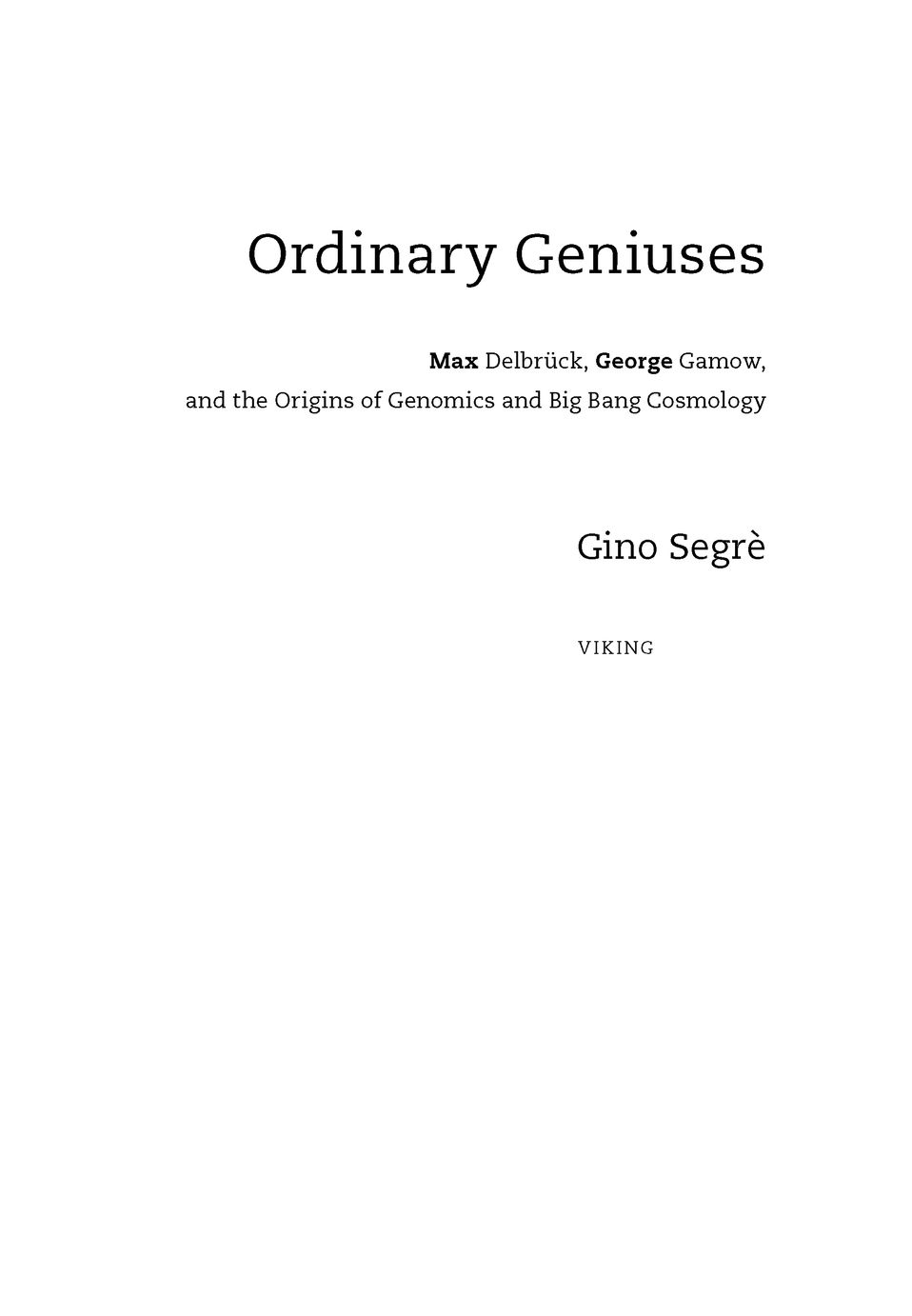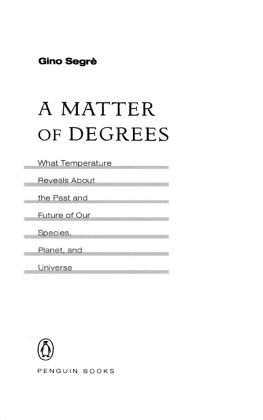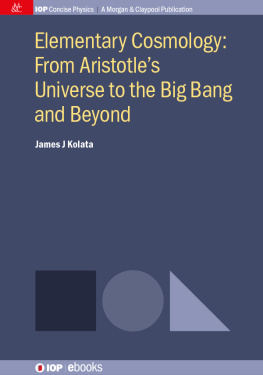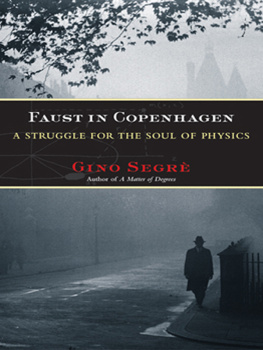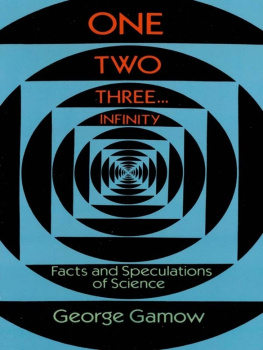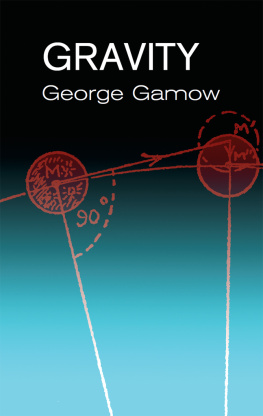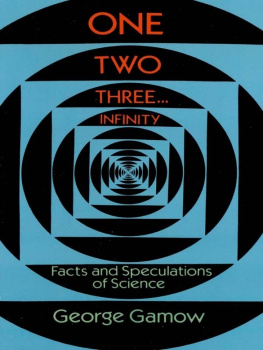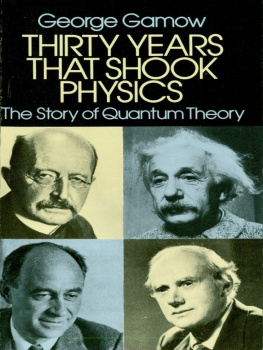Table of Contents
Also by Gino Segr
Faust in Copenhagen:
A Struggle for the Soul of Physics
A Matter of Degrees:
What Temperature Reveals About the
Past and Future of Our Species, Planet, and Universe
For the mavericks of science, young and old.
Enjoy the quest.
Introduction
I decided to choose myself a corner where nobody was doing anything, so I chose nuclear physics.
George Gamow
Dont do fashionable research.
Max Delbrck
A freshman in my Introductory Physics class recently asked me what I thought were the most exciting areas in science today. She was a very good student, one of the best in the class. She was interested in pursuing a career in basic science but uncertain about which avenue to pursue. I felt she would do well at anything she set her mind to but was hesitant to specify a particular area, so I gave her some general advice, telling her to keep her options open, try working in a few labs, get a summer job doing research, and then see what caught her fancy.
She wanted a little more than generalities, though, and questioned me further. Feeling the need to respond, I told her that my top choices for her were cosmology, the study of the universe; and genomics, the analysis of organisms genomes. One deals with the world at the macro level, the vast cosmos we are a part of, and the other with the world at the micro level, the smallest aspects of living creatures.
Cosmology has what I consider the greatest unsolved question in the physical sciences, or at least the greatest one that is likely to be addressed successfully in the next two decades: What is our universe made of? All the observed matter, such as stars, planets, and dust, constitutes only 5 percent of what gravitational action tells us is present. We give the remaining 95 percent the names dark energy and dark matter, names chosen because these entities do not seem to emit any recognizable signal. Discovering their identity will surely be a turning point in our view of the universe.
Genomics, like cosmology, has several great unanswered questions. One of them can be succinctly phrased as, how do we decipher the set of instructions for the assembly of living organisms? In the 1970s, when the initial forays into sequencing DNA were made, scientists were surprised to find that most of the information placed in the genetic code did not seem to specify any known function. The analogy to cosmology might have worked better if biologists had chosen to call the seemingly surplus data dark DNA, but they opted instead for a more colorful term: junk DNA. In recent years, after discovering some of its functions, they have replaced this amusing but seemingly pejorative label with the term non-coding DNA. Still, puzzles about its purpose abound. In addition, as gene sequencing becomes ever more powerful and ever less expensive, we are likely to realize the long-awaited revolution in medicine that knowledge of our genetic structure promises.
My student seemed clearly excited about these challenges. I know that by the time she starts her career, new research instruments will be yielding data that cannot be predicted now. After she left my office that day, I found my thoughts drifting from the futures of cosmology and genomics to their pasts, thinking about how they achieved their present status and who the key players in their respective developments were. Doing so led me to consider the intertwined lives of two individuals near and dear to me.
Both were born in the early years of the twentieth century. Trained initially as physicists, they both continued to think of themselves this way even after moving to other fields. They met briefly in the German university town of Gttingen and became reacquainted in Copenhagen, Denmarks capital. They established a friendship there and even worked together for a while before going their separate ways, only to reconnect years later in their new country, the United States.
George Gamow, usually called Geo (pronounced Joe), was Russian, and Max Delbrck, invariably known simply as Max, was German. Geo came to be seen as the father of Big Bang cosmology, the first to glimpse how the expanding hot cauldron of the universes first minutes could form the present worlds elements. Max became an iconic figure in the study of bacteriophages, the viruses that provide the simplest means of studying genetic replication. Focusing on these viruses was a key step in uncovering the structure of DNA. Geo and Max can rightly be viewed as founders of modern cosmology and genomics, the two groundbreaking fields I was advising my student to pursue.
Yet, though each of them helped launch a revolution in science, I do not think of them as extraordinary geniuses. Max and Geo are not like the three men who helped steer the quantum mechanics revolution: Wolfgang Pauli, Werner Heisenberg, and Paul Dirac. They did not receive Nobel Prizes for work they accomplished in their twenties, were not awarded prestigious professorships at a tender age, nor were they hailed as leaders in their field before they turned thirty. They also did not, like Francis Crick and James D. Watson, ever write an early paper that changed the direction of science, much less one that reshaped our notions of space and time as Einstein did in 1905. Still, their work has had a lasting influence and has changed modern science.
Pauli, Heisenberg, Dirac, and of course Einstein were extraordinary geniuses, whereas Max and Geo were only ordinary geniuses, smarter and more imaginative than you and me, but not qualitatively different from us. The famous mathematician Mark Kac made the distinction somewhat differently, comparing ordinary geniuses with magicians. These are individuals whose inventions are so ingenious it is hard to see how any mortal could have imagined them. Theirs are not, however, necessarily the most influential creations. In the right circumstances, through good judgment, perseverance, character, and, we must not forget, luck, even ordinary geniuses can lead a revolution in science. To their enduring credit, this is exactly what Max and Geo did.
Part of the reason Max and Geo are so near and dear to me is the greatness of what they achieved, but there are other reasons why I find them so attractive. I certainly appreciate their consistent effort to look at the big picture, to think big thoughts and remain undeterred even when proved wrong. A remark made by Alfred Hershey, a biologist who shared the Nobel Prize with Max, stuck with me. He described how Max kept his eye on the big questions, even before they could be put into words. This is something few scientists can do. These words could apply equally well to Geo, a man who always seemed to be years ahead of his contemporaries. Being so requires formidable intuition, certainly a quality I admire in both Max and Geo, but there is something they possessed that I value even more highly: intellectual courage. Each had it in abundance, combining it with quirkiness in thought and behavior that frequently led them off the beaten path.
Their story would be less interesting had they not also been such lovers of fun. Geo always attempted to transform any gathering into revelry, and his practical jokes became the stuff of legend. On the surface Max appeared quieter, but as his close friend and collaborator Salvador Luria said,

